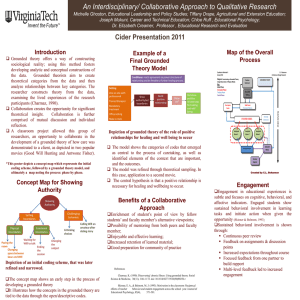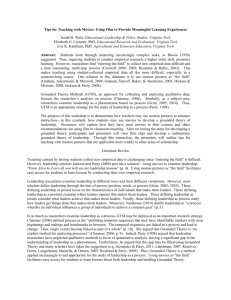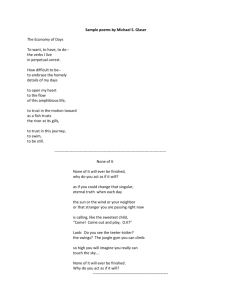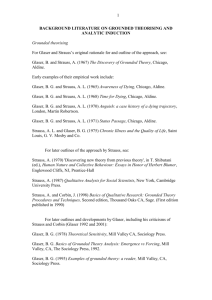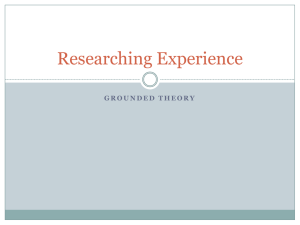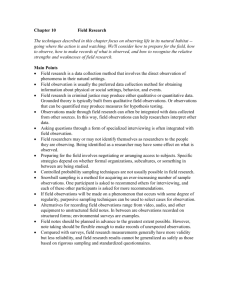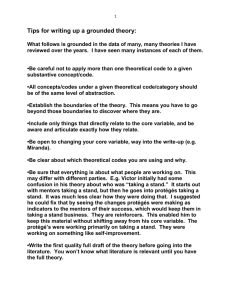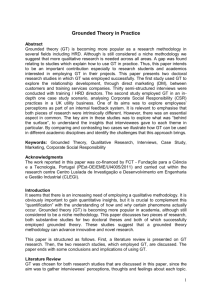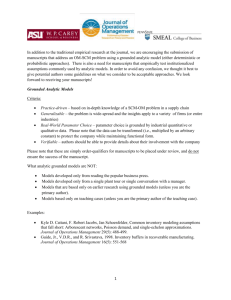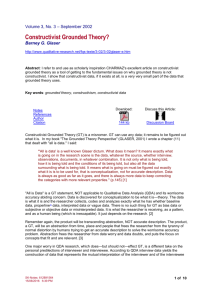Table 1 Fundamental components of a grounded theory study
advertisement
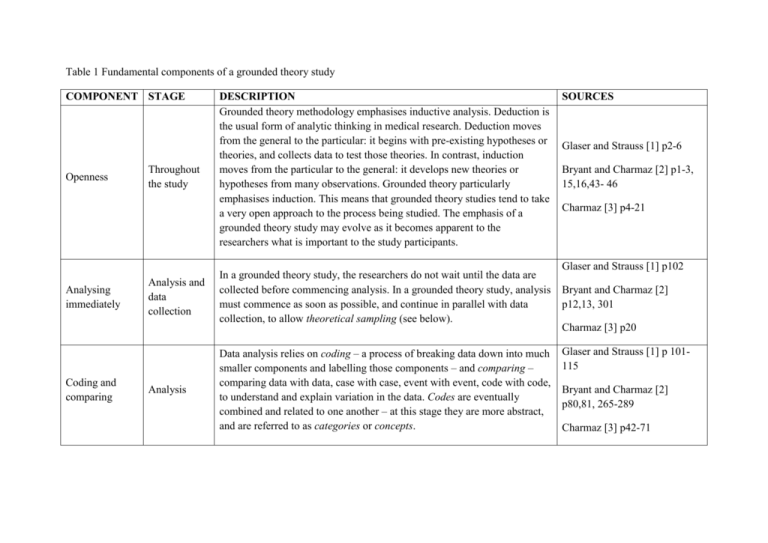
Table 1 Fundamental components of a grounded theory study COMPONENT STAGE Openness Analysing immediately Coding and comparing Throughout the study Analysis and data collection Analysis DESCRIPTION Grounded theory methodology emphasises inductive analysis. Deduction is the usual form of analytic thinking in medical research. Deduction moves from the general to the particular: it begins with pre-existing hypotheses or theories, and collects data to test those theories. In contrast, induction moves from the particular to the general: it develops new theories or hypotheses from many observations. Grounded theory particularly emphasises induction. This means that grounded theory studies tend to take a very open approach to the process being studied. The emphasis of a grounded theory study may evolve as it becomes apparent to the researchers what is important to the study participants. In a grounded theory study, the researchers do not wait until the data are collected before commencing analysis. In a grounded theory study, analysis must commence as soon as possible, and continue in parallel with data collection, to allow theoretical sampling (see below). Data analysis relies on coding – a process of breaking data down into much smaller components and labelling those components – and comparing – comparing data with data, case with case, event with event, code with code, to understand and explain variation in the data. Codes are eventually combined and related to one another – at this stage they are more abstract, and are referred to as categories or concepts. SOURCES Glaser and Strauss [1] p2-6 Bryant and Charmaz [2] p1-3, 15,16,43- 46 Charmaz [3] p4-21 Glaser and Strauss [1] p102 Bryant and Charmaz [2] p12,13, 301 Charmaz [3] p20 Glaser and Strauss [1] p 101115 Bryant and Charmaz [2] p80,81, 265-289 Charmaz [3] p42-71 Memo-writing (sometimes also drawing diagrams) Analysis The analyst writes many memos throughout the project. Memos can be about events, cases, categories, or relationships between categories. Memos are used to stimulate and record the analysts’ developing thinking, including the comparisons made (see above). Glaser and Strauss [1] p108,112 Bryant and Charmaz [2] p245264,281, 282,302 Charmaz [3] p72-95 Theoretical sampling Theoretical saturation Production of a substantive theory Theoretical sampling is central to grounded theory design. A theoretical sample is informed by coding, comparison and memo-writing. Theoretical sampling is designed to serve the developing theory. Analysis raises Sampling and questions, suggests relationships, highlights gaps in the existing data set data and reveals what the researchers do not yet know. By carefully selecting collection participants and by modifying the questions asked in data collection, the researchers fill gaps, clarify uncertainties, test their interpretations, and build their emerging theory. Sampling, data collection and analysis Analysis and interpretation Glaser and Strauss [1] p 45-77 Bryant and Charmaz [2] p304, 305, 611 Charmaz [3] p96-122 Qualitative researchers generally seek to reach ‘saturation’ in their studies. Often this is interpreted as meaning that the researchers are hearing nothing new from participants. In a grounded theory study, theoretical saturation is sought. This is a subtly different form of saturation, in which all of the concepts in the substantive theory being developed are well understood and can be substantiated from the data. Glaser and Strauss [1] p 111113 The results of a grounded theory study are expressed as a substantive theory, that is, as a set of concepts that are related to one another in a cohesive whole. As in most science, this theory is considered to be fallible, dependent on context and never completely final. Glaser and Strauss [1] p21-43 Bryant and Charmaz [2] p306, 281,611 Charmaz [3] p114, 115 Bryant and Charmaz [2] p14,25 Charmaz [3] p123-150
